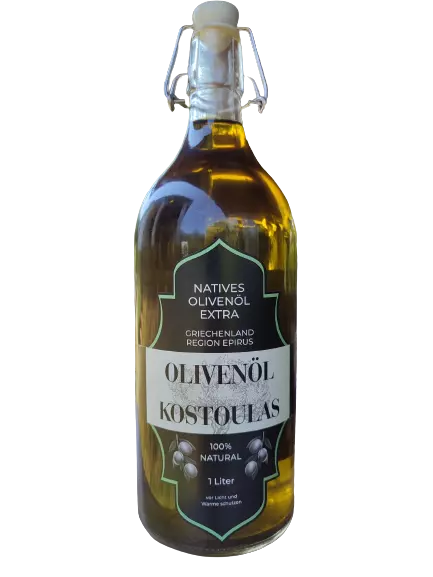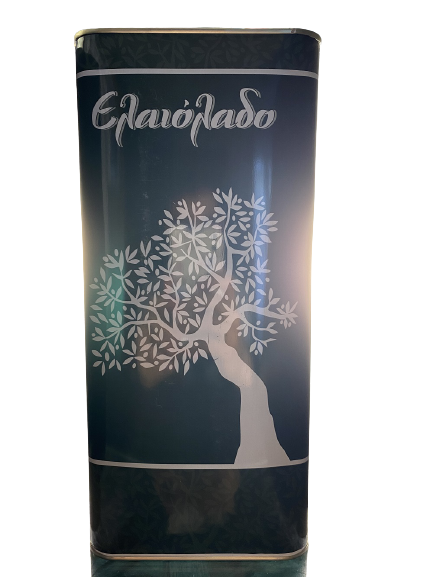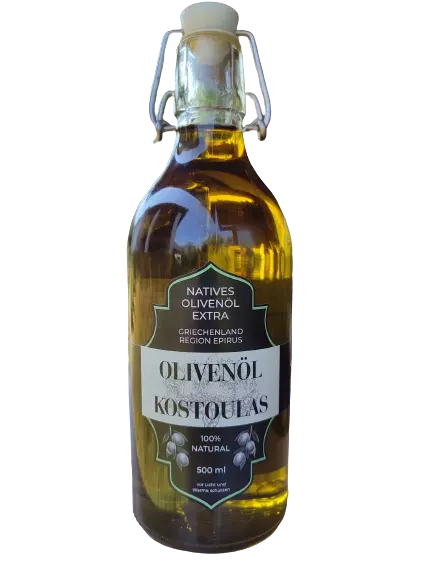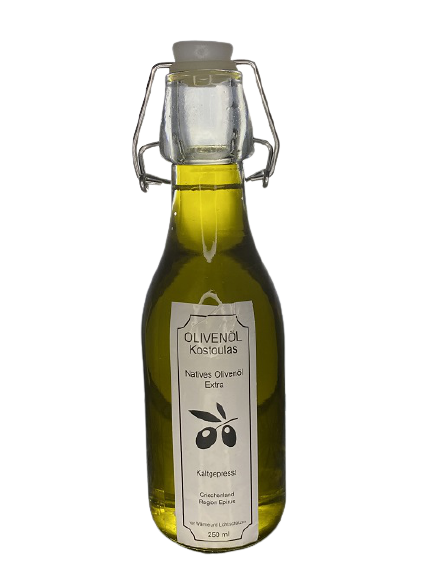Products
Price adjustment:
Due to the current increased costs for olive oil we have to adjust our prices for the season 2023/24
unfortunately make adjustments to our prices. We are always striving to continue to offer you
offer you high quality products.
Source: Bloomberg Link | Article Link | International Olive Council Link
We are
Description
We are the Kostoulas family, a dedicated team consisting of several generations. From my in-laws to my children to my husband and me, Michaela. Our passion is the cultivation and harvesting of olives to produce high quality olive oil.
Every year in November begins for us the longed-for harvest time, in which we pick the "black gold" from our olive trees together with the greatest care. In doing so, we proceed carefully to ensure that only the best olives end up in our olive oil. It is important to us that the harvest is done by hand to preserve the quality and taste of our olive oil.
After harvesting, we immediately take the olives to a nearby oil mill where they are cold pressed. We are proud of the fact that we supervise and are involved in every step of the processing ourselves. This personal involvement allows us to guarantee the top quality of our olive oil and ensure that it preserves the unique flavors and nutrients of our olives.
Michaela
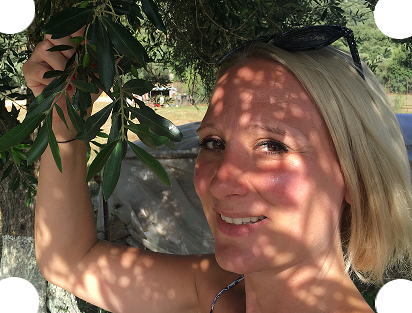
Our goal is to offer you an olive oil that not only stands out for its exceptional quality, but also reflects the love, dedication and traditional craftsmanship of our family. With every drop of our olive oil we want to bring you closer to the unique flavors of Greece and enrich your culinary experiences.
Family
Our olive oil is the result of a passionate family tradition, where olives are grown and carefully harvested under the radiant sun of Greece. We place great emphasis on producing high quality olive oil that embodies the essence of Greek cuisine.
Every step, from the careful selection of olive trees to the gentle processing, is carried out by our family with dedication and expertise. The olives are harvested at the perfect time of ripeness and processed in our mill within the shortest possible time to ensure that all the valuable flavors and nutrients are preserved.
Immerse yourself in the world of Greek olive oil and discover the incomparable taste that will enrich your dishes. We are proud to offer you a product that our family has proudly produced and that carries the beauty and flavor of Greece.
Contact us
For orders or further questions we are at your disposal. Please use our Contact form or contact us via Instagram
We look forward to hearing from you and assisting you with your concerns.
Our delivery service includes personal and free delivery of your order within Munich and a radius of about 20 km outside Munich. We want to make sure that you receive your products conveniently and promptly without having to bear additional delivery costs.
Harvest production
-
0Which tool do we use?
Our harvesting attaches great importance to not harming the environment through the use of polluting equipment. Therefore, we consistently refrain from using gasoline- or electricity-powered tools. This principle forms a central criterion for our harvesting methods. Our goal is to respect the environment and leave the trees intact in order to obtain the maximum olive harvest.
We focus on sustainability by using environmentally friendly methods that are in harmony with nature. By deliberately avoiding equipment that could cause harmful emissions, we actively contribute to the protection of the environment. At the same time, we ensure that the olive trees are not damaged by the use of machinery.
Our approach allows us to ensure an optimal olive harvest without harming nature. We are proud to fulfill our environmental responsibilities while harvesting high quality olives. Together we set an example for sustainable agriculture and the protection of our natural resources.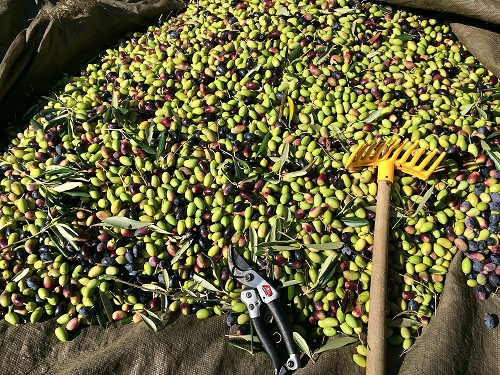
-
01 Step - Preparation
A familiar sight from vacations in Greece: the olive tree tarpaulin is the starting point of our harvesting processes. These black nets are placed under the trees and ensure efficient harvesting.
The olive tree tarpaulin performs an important function. It catches the falling olives and ensures that no valuable fruit is lost. At the same time, it facilitates the collection and cleaning of the olives to ensure optimal quality.
Our carefully selected black nets are specially adapted to the needs of olive trees. They hang reliably on the branches and allow a gentle harvest. This proven method ensures that the trees remain undamaged and we can achieve a rich harvest. -
02 Step - Spare branches
To detach the olives from the branches and bring them to the prepared tarpaulin, we use a rake. This tool plays a crucial role in the harvest, especially for branches that are inaccessible by climbing.
With the raking we achieve an efficient harvest, since we can easily reach the higher branches. In this way, as many olives as possible are harvested without harming the tree or the surrounding vegetation.
We used the rake to carefully comb each branch and drop the olives on the ready tarp. In this way we ensure that no valuable fruit is lost and they are ready for further processing in the best condition.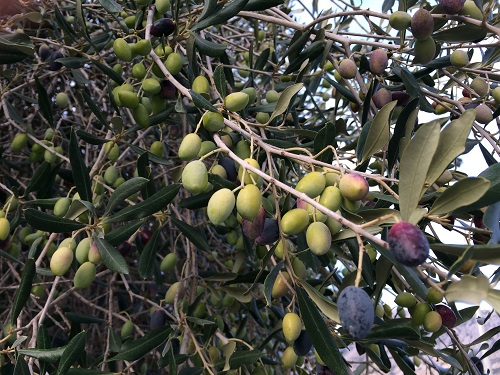
-
03 Step - Harvest
A healthy olive tree requires regular pruning after harvest to grow and thrive optimally. Either a saw or loppers are used, depending on the size of the tree.
You may wonder why pruning is so important for harvesting. Here comes the connection: when a branch needs to be removed while sparing the other branches or neighboring trees, a rope is tied around the branch to be cut. This is the moment when teamwork is required. One person climbs the tree and makes the cut while another carefully pulls the rope. This ensures that the cut branch falls safely to the ground without causing damage or hurting anyone.
Proper care and precise pruning after harvest are critical to maintaining a healthy olive tree. -
04 Step - Collect
After the olives are successfully harvested, they are collected in a bucket to prepare them for further processing. Subsequently, they are carefully placed in special bags, ideal for both storage and transportation.
-
05 Step - mill
The following figure shows the process flow in the mill.
History
Olive oil is also known as "liquid gold" since Homer first called it that thousands of years ago.
Here we would like to give an overview of the most diverse stories around the olive oil. Have fun reading!
The foundation of Athens
The story about the foundation of Athens is about a contest between Athena and Poseidon. The two gods competed with each other for the favor of the inhabitants of a place. To win the dispute, each of them made a gift to the locality. Whoever chose the most beautiful gift would win the contest and become the city's namesake. As god of the sea, Poseidon gave the inhabitants a fountain. But as it is with sea water, the well bubbled only with salty water. Athena, on the other hand, rammed her lance into the ground and gave the place an olive tree that grew on the spot. Instead of undrinkable water, it gave the inhabitants food, olive oil and wood. Thus, she was crowned the winner and the place was called Athens in her memory from then on.
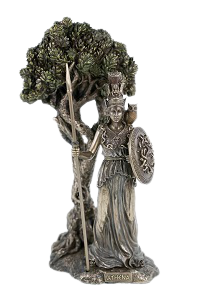
The competition
Zeus, the father of the gods, set up a contest for the supremacy of Attica (in ancient times Attica was considered the center of Greece).
In the contest for supremacy over Attica, Poseidon put a horse on earth that helped people haul loads, wage warfare, and cover great distances.
The goddess Athena, on the other hand, planted an olive tree that served people food and oil for body care, preservation, cosmetics, healing, for sacred purposes and as a fragrance or lamp oil.
Athena won the contest and after her the center of Attica was named Athens. Even the father of all gods was shown on Olympus with a statue wearing a wreath of olive branches.
The emergence of peace
In the Greek-Roman mythology is preserved the legend of Minerva, who touched the ground with a sword and as a result an olive tree grew in this place. Minerva put down the weapons of war and exchanged them for an olive branch of peace.
Where does the olive tree come from?
It is generally believed that the olive tree known and cultivated today is descended from the plant Olea chrysophylla. Through long years of crossbreeding, the olive tree we know was cultivated in Asia Minor. The spread in Europe then followed through the northern side of the Mediterranean (through Turkey or Crete and Greece to Italy and the Balkans and from there to France, Germany and Spain), and through the southern Mediterranean (through Libya to Tunisia, to Algeria and then through Morocco and the Strait of Gibraltar to Spain and the rest of Europe).
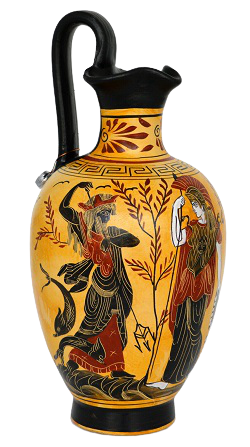
The Bible
The Bible, in the sum of the two Testaments, refers to olive oil over 130 times and again to the olive tree over 100 times.
We all know the story of Noah's Ark - Remember the place where Noah sent out a dove to er kundschaften whether life thrives on earth again?
This dove came back to the Bible with an olive branch and life on earth was present again. Until today, this dove with the olive branch in the beak is a symbol of peace, so you also decorates the logo of the United Nations.
The Koran
In the Koran, olive oil and the olive tree are mentioned countless times. In general, it can be said that the olive tree is revered as a sacred tree, it is said that olive oil is like light that imperceptibly illuminates the mind and spiritual perception. Prophet Mohammed is even said to have recommended olive oil and saffron threads for inflammation, and he used to say that olive oil, as well as olives, is the medicine of the poor.
The Olympic Games
For example, it is known that the winners of the ancient Olympic Games received an olive branch as a prize for victory. In addition, the poet Homer, known among other things for his work "The Odyssey", reports of participants in the Olympic Games who kept an olive oil diet during the competition. Apparently, the athletes promised themselves particularly high strength and endurance from this diet. The very fact that until today, the fire for the torch relay of the Olympic Games at the historic site of Olympia is lit with olive oil, proves the importance of this product for the ancient Greeks. The winners of the ancient Olympic Games received a wreath made of olive branches and a container of the purest virgin drip oil. Athletes applied a thick layer of olive oil to their skin and ate a special olive oil diet before competitions. There are even traditions according to which in ancient Greek cuisine all dishes were served or prepared with Greek olive oil, whether desserts or hearty.
Note:
The above stories and narrative are a summary of a wide variety of sources / pages from the Internet. If someone feels offended or misunderstood by a statement, we ask them to contact us and we will remove the relevant post from the site. For this purpose use our Contact form
Recipes
Greek Pizza
- 2 EL Olive oel
- 1 TL Balsamic vinegar
- 1 Onion (small, red, cut into thin rings)
- 1 Pizza base (large, thin, pre-baked (about 300 g))
- 3 EL Tomato paste
- 8 Cocktail tomatoes (halved)
- 500 g dried tomatoes (in oil, cut into thin strips)
- 12 Olives (black or green, pitted)
- 150 g Feta (crumbled)
Preheat the oven to 220°C. In a bowl, whisk together 1 tablespoon of olive oil and the vinegar.
Mix in the onion rings and let sit while you prepare the rest of the ingredients.
Spread the pizza base with the tomato paste. Spread onion rings and tomato halves on top.
Sprinkle dried tomatoes, olives and feta on top and drizzle the pizza with the remaining oil.
Place the pizza on the oven rack and put it in the oven on the top shelf.
In case some drips down, put a tray lined with baking paper underneath. Bake the pizza for 10 minutes, until the base is crisp and the topping is lightly browned. Remove, season with black pepper, cut into pieces and serve.

Greek pita bread
- 400g Flour
- half cube yeast
- 1 cup water, lukewarm
- 1/2 Cup milk
- 2 TL Salt
- 2 TL Sugar
- 2 EL Olive oil
- Oil (Sunflower oil)
- handful oregano
Mix water and milk. Transfer 1/3 of it into another container - will be needed later.
Add sugar, crumble in yeast and mix.
Sift flour into a bowl and make a well in the center. Gradually add the yeast liquid to the well and knead into a pre-dough. Leave to rise in a warm place, covered, for 15 minutes.
Mix remaining milk water with salt and again slowly work into the pre-dough. Knead the dough for approx. 10 min. until a loose homogeneous mass is formed. If necessary, add a little flour or lukewarm water. Work in olive oil. Divide dough into 8 pieces and shape into balls. Leave to rise in a warm place, covered, for 30 minutes.
Preheat oven to 160ºc (or top, bottom heat 180ºc).
Coat baking sheet with sunflower oil. Roll out balls into patties (approx. 15 cm Ø, thickness 4-5 mm).
Always distribute only 4 patties on the tray. Please do not put several trays in the oven at the same time! Bake the patties on a medium shelf height for 4-5 minutes. Then turn them over and bake again until done. The patties should still be white and soft.
A little olive oil in a frying pan and lightly fry the pita bread. Depending on your preference, you can pour a little olive oil and oregano (Rigani).
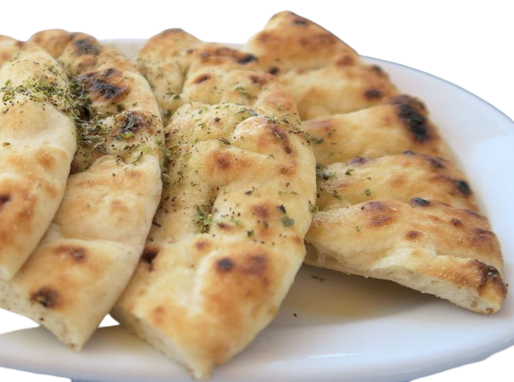
Chili olive oil
- 500ml Bottle
- 2-3 Chili pepper (partially cut, others whole)
- 1-2 Garlic cloves (pressed)
- 1 Rosemary sprig
- 1 TL herbs of Provence
Put all the ingredients in the bottle and fill to the brim with olive oil.
Store in the dark for 1 week. Enjoy.
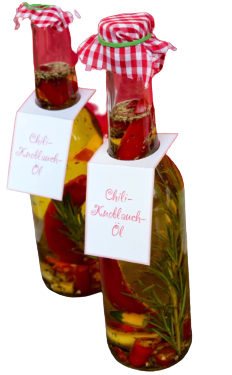
Questions and answers
Frequently asked questions and our answers
-
Why does my olive oil flake?
At temperatures below +7 °C, olive oil can become flaky. The snowflake-like crystals are waxes from the olive peel that solidify at these temperatures. This is normal and does not affect the quality of the oil.
-
How can I tell that it is good olive oil?
There are legal limits. For an olive oil to be sold under the designation "extra virgin olive oil," the free fatty acid content, calculated as oleic acid, must not exceed 0.8% according to European Regulation No. 1234/2007.
Our olive oil from the harvest 2022 is 0.3%. -
Do I get my money back if I don't like the olive oil?
No, there is no return option as it is a specially bottled product.
We recommend buying a small amount first, e.g. 250 ml, and trying out the product. -
What all can I order? What selection has olive oil Kostoulas?
Olivenöl
- 5 Liter Canister - 45 €
- 1 Liter Bottle - 12 €
- 500 ml Bottle - 8 €
- 250 ml Bottle - 4 €
-
How can I pay?
Cash on delivery or PayPal
-
Will I receive an invoice?
Do you need an invoice, then please indicate this with your order. This will be sent to your email address on the day of delivery/collection.
Out of consideration for the environment, we do not hand out printed invoices. -
Where can I have the oil delivered to?
To Munich or up to 20 km distance outside of Munich. Or we can arrange a meeting point in the middle.
-
I live outside of Munich, is personal delivery possible?
Delivery outside Munich is possible for an agreed surcharge, which will be arranged in advance.
Contact
If you would like to place an order, ask questions or criticize, please use the contact form.
Your data will not be disclosed to third parties.
Adress:
Mohrstr. 21
80939 Munich
Email:
kontakt@olivenoel-kostoulas.de

